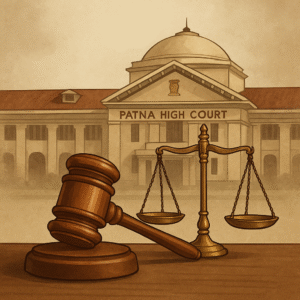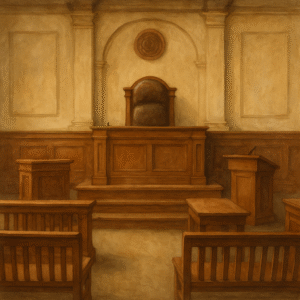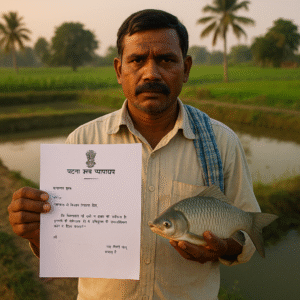Simplified Explanation of the Judgment
The Patna High Court, in a recent decision, set aside a ten-year debarment order issued by the Rural Works Department, Government of Bihar, against a registered partnership firm engaged in road construction. The case highlights the importance of following due process and the principles of natural justice before imposing any punitive action that carries significant civil and penal consequences.
The petitioner, a construction firm, had entered into an agreement dated 26 September 2017 for the maintenance of specific road projects, including Bettiah Ramnagar Road to Sikhta via Dhobni and Ramauli, and PWD Road from Narwal to Khiriya. On 16 July 2021, the Engineer-in-Chief of the Rural Works Department issued a letter (No. 2100) debarring the petitioner along with others for allegedly failing to perform timely maintenance work.
The petitioner approached the High Court seeking to quash the debarment order on several grounds:
- No show cause notice was served before the order was issued.
- The order violated Articles 14 and 19(1)(g) of the Constitution, which ensure equality before the law and the right to practice any profession or carry on trade or business.
- The debarment was disproportionate and without reasoning, effectively barring the petitioner from participating in tenders for a decade.
- There was non-compliance with an earlier High Court directive in Raman Kumar Singh vs. Bihar State Food and Civil Supplies Corporation Ltd. (CWJC No. 16989 of 2017), where a similar indefinite debarment had been quashed.
The High Court examined the impugned order and noted serious procedural lapses:
- Violation of Natural Justice – The debarment was imposed without giving the petitioner an opportunity to explain or defend against the allegations.
- Lack of Reasoning – The order contained no plausible explanation for the severe penalty.
- Non-compliance with Precedent – The authorities ignored prior High Court directions emphasizing proportionality and procedural fairness in blacklisting cases.
- Disproportionate Penalty – A 10-year debarment is an extreme measure with severe consequences for livelihood and business opportunities.
The Court reiterated that blacklisting has far-reaching implications, both civil and penal, and must always be preceded by proper notice, reasoning, and adherence to proportionality. Since these safeguards were absent, the order could not stand in law.
The Bench therefore quashed and set aside the order dated 16 July 2021, restoring the petitioner’s eligibility to participate in government tenders. The Court also acknowledged that the petitioner had already suffered financially by being unable to bid for any tenders since the order’s issuance.
Significance or Implication of the Judgment
This judgment reinforces the principle that no person or entity can be penalized without due process. For contractors, suppliers, and service providers dealing with government departments, the decision underscores that:
- Authorities must issue a show cause notice before blacklisting.
- The punishment must be proportionate to the alleged misconduct.
- Reasoned orders are necessary to justify penalties.
- Government departments cannot ignore earlier court rulings on the same issue.
For the government, it is a reminder that administrative efficiency cannot come at the cost of constitutional safeguards. Failure to follow these principles can result in quashing of orders, wasted administrative effort, and potential legal liabilities.
Legal Issue(s) Decided and the Court’s Decision
- Whether a government department can debar a contractor without giving prior notice or reasons.
Decision: No. Such action violates principles of natural justice. - Whether proportionality must be considered when imposing penalties like blacklisting.
Decision: Yes. Extreme penalties must be justified with sound reasoning. - Whether previous High Court directions on similar matters are binding on government authorities.
Decision: Yes. Ignoring binding precedent is impermissible.
Judgments Referred by Parties
- Raman Kumar Singh vs. Bihar State Food and Civil Supplies Corporation Ltd., Bihar Patna & Ors., CWJC No. 16989 of 2017 (20.02.2018)
Judgments Relied Upon or Cited by Court
- Raman Kumar Singh vs. Bihar State Food and Civil Supplies Corporation Ltd., CWJC No. 16989 of 2017
Case Title
M/s Chandra Mohan Ojha vs. The State of Bihar & Ors.
Case Number
Civil Writ Jurisdiction Case No. 14295 of 2022
Coram and Names of Judges
Hon’ble the Chief Justice Sanjay Karol
Hon’ble Mr. Justice S. Kumar
Names of Advocates and Who They Appeared For
For the Petitioner: Mr. Ashish Giri, Advocate
For the Respondents: Smt. Archana Meenakshee, GP 6
Link to Judgment
If you found this explanation helpful and wish to stay informed about how legal developments may affect your rights in Bihar, you may consider following Samvida Law Associates for more updates.








